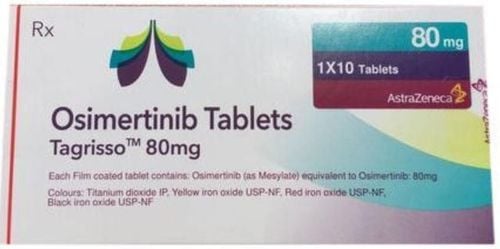This is an automatically translated article.
Brigatinib, also known by the common name Alunbrig, is a drug commonly used in the treatment of cancer. Besides the effective effects that the drug brings, it also causes unwanted reactions.
1. What is brigatinib?
What is Brigatinib? Brigatinib is used to treat certain cancers such as: Non-small cell lung cancer.
In addition, the drug is used to treat a number of other cancers such as: anaplastic lymphoma positive, metastatic non-small cell lung cancer when the patient's use of the drug crizotinib is ineffective or The patient's body cannot tolerate the drug.
2. Dosage and how to use Brigatinib
How to use: Brigatinib can be taken with or after a meal. In order for the drug to work best, the patient should swallow the tablet whole, do not crush or chew the tablet.
Dosage:
The usual dose is 90 mg / time / day and used for the first 7 days. When the body can tolerate 90 mg/day, increase the dose to 180 mg. In the treatment of non-small cell lung cancer a dose of 90 mg orally once daily for the first 7 days is used. If the patient's body can tolerate the dose of 90 mg / day well, increase the dose to 180 mg, taken once daily. Continue using until the disease shows signs of remission. Note: If during the course of treatment with the drug, but it is interrupted for a period of 14 days or longer for some reason such as experiencing side effects, after stopping using the drug, the patient can continue to use the dose. Dosage was 90 mg once daily for 7 days before increasing to a previously tolerated dose.
Need to adjust the drug in the following cases:
Hypertension Grade 3 hypertension with systolic blood pressure 160 mmHg or higher or diastolic blood pressure 100 mmHg or higher: Patient stops until hypertension is resolved control.
If hypertension recurs or becomes more severe, the patient should discontinue the drug until recovery.
Bradycardia Patients should temporarily discontinue the drug until the heart rate recovers or the resting heart rate is 60 beats per minute (bpm) or higher.
Need to find out the cause of bradycardia symptoms, then continue using brigatinib. If it is not known that the drug used in combination with brigatinib causes bradycardia, the next lower dose may be continued.
When co-administered with CYP3A inducers, the patient should increase the dose by 30 mg gradually after 7 days of treatment to the currently tolerated dose, up to a maximum of twice the previously tolerated dose. CYP3A inducer.
Liver failure Cases of mild or moderate disease may not require dose adjustment. In case of severe renal failure or requiring hemodialysis, the dose should be reduced to once daily by about 40%. For example, from 180 mg to 120 mg, 120 mg to 90 mg, or from 90 mg to 60 mg.
Renal failure Mild or moderate renal failure with CrCl 30-89 ml/min, patients do not need to adjust the dose. If severe renal impairment requires a CrCl level of 15-29 ml/min: Reduce brigatinib dose by approximately 50%. Specifically, if you are taking a dose of 180 mg, it should be reduced to 90 mg, or from 90 mg to 60 mg.
3. Brigatinib side effects
Some possible side effects when treated with the drug include: Hyperglycemia, nausea, fatigue, headache, shortness of breath, increased amylase, increased ALT, nausea, dizziness, loss of appetite, diarrhea, constipation, increased lipase, cough, abdominal pain, fever, joint pain, muscle spasms, increased blood pressure, decreased phosphorus, back pain, pneumonia, visual disturbances, low blood oxygen levels, loss sleep, pain in the extremities.
4. Be careful when using Brigatinib
Use brigatinib with caution in the following cases:
Using brigatinib can cause lung damage, worse even death in patients with existing interstitial lung disease or pneumonia. Therefore, patients should be closely monitored for respiratory symptoms such as shortness of breath, cough, especially during the first week of starting the drug. The use of brigatinib can cause an increase in blood pressure, so blood pressure should be monitored 2 weeks after taking the drug when stopping use of the drug. Bradycardia is one of the problems patients need to keep in mind while taking the drug. May cause visual disturbances, patients should report to the doctor when experiencing any symptoms related to vision. The drug can cause elevation of serum pancreatic enzymes, patients need to monitor lipase and amylase levels during treatment. The drug can cause hyperglycemia, so patients should monitor and assess fasting blood glucose levels and before periodically starting the drug thereafter. Dosage should be adjusted as needed. For pregnant women: Brigatinib can cause harm to an unborn baby when administered to a pregnant woman. Therefore, it is not recommended to use the drug in pregnant women. Male fertility: Brigatinib may cause decreased fertility in men. Women of childbearing potential should use contraception during treatment with brigatinib and for at least 4 months after the last dose. Lactation: It is not known whether brigatinib is excreted in human milk. Because of the potential for fetal development, nursing women should temporarily discontinue breast-feeding during treatment with brigatinib and for at least 1 week after the last dose. Concomitant use with CYP3A substrates, including hormonal contraceptives, may decrease drug concentrations and render the drug ineffective.
5. Drug interactions
When used in combination with some of the following drugs, may cause interaction with brigatinib, specifically:
Co-administration with Acetaminophen : Acetaminophen serum concentration may increase when it is combined. with Brigatinib Propacetamol: Propacetamol serum concentrations may be increased when it is combined with brigatinib. Mifepristone: When Brigatinib is combined with Mifepristone serum concentrations of Brigatinib may increase. Secobarbital: The metabolism of Brigatinib may be increased when combined with Secobarbital. Primidone: The metabolism of brigatinib may be increased when combined with Primidone. Phenobarbital: Brigatinib metabolism may be increased when combined with Phenobarbital. Bexarotene: Brigatinib metabolism may be increased when combined with Bexarotene. Diltiazem: The metabolism of brigatinib may be increased when combined with Diltiazem. Amlodipine: The metabolism of brigatinib may be increased when combined with Amlodipine. Rosiglitazone: The metabolism of brigatinib may be increased when combined with Rosiglitazone. Brigatinib is used to treat certain cancers such as: Non-small cell lung cancer. To ensure effective treatment, patients need to carefully read the instructions and follow the instructions of the doctor, professional pharmacist.
Follow Vinmec International General Hospital website to get more health, nutrition and beauty information to protect the health of yourself and your loved ones in your family.
Please dial HOTLINE for more information or register for an appointment HERE. Download MyVinmec app to make appointments faster and to manage your bookings easily.













